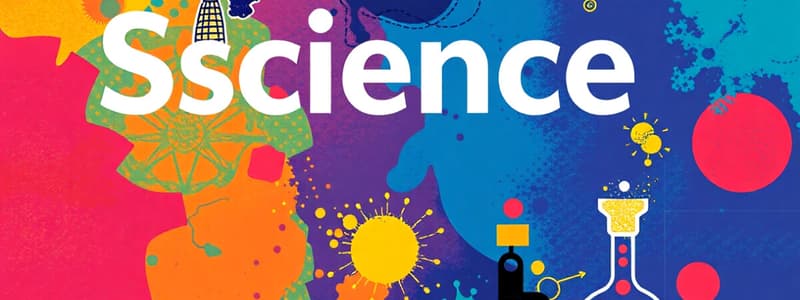Podcast
Questions and Answers
What is the main goal of the scientific method?
What is the main goal of the scientific method?
- To ensure that only one hypothesis is tested in an experiment.
- To prove existing theories without questioning them.
- To gather data and ignore the analysis phase. (correct)
- To systematically approach inquiry through observation and experimentation.
Which of the following best describes natural sciences?
Which of the following best describes natural sciences?
- Focus on human behavior and societal interactions.
- Concerned with the physical world and its phenomena. (correct)
- Studies abstract concepts through logical reasoning.
- Analyze the implications of economic systems.
In the context of scientific research, what distinguishes a law from a theory?
In the context of scientific research, what distinguishes a law from a theory?
- A theory is a hypothesis that hasn't been tested.
- Laws are temporary explanations awaiting confirmation.
- Laws are based on repeated observations, while theories are well-substantiated explanations. (correct)
- Theories can only apply to physical sciences, laws do not.
Which subfield of formal sciences specifically focuses on the processing of information?
Which subfield of formal sciences specifically focuses on the processing of information?
What role does replication play in the scientific method?
What role does replication play in the scientific method?
Study Notes
Definition of Science
- Systematic study of the natural world through observation and experimentation.
- Aims to understand, describe, and predict phenomena.
Branches of Science
- Natural Sciences
- Concerned with the physical world.
- Subfields:
- Physics (study of matter and energy)
- Chemistry (study of substances and their interactions)
- Biology (study of living organisms)
- Formal Sciences
- Deal with abstract concepts and logical reasoning.
- Subfields:
- Mathematics (study of numbers and shapes)
- Logic (study of reasoning)
- Computer Science (study of information processing)
- Social Sciences
- Study human behavior and societies.
- Subfields:
- Psychology (study of the mind and behavior)
- Sociology (study of social behavior and structure)
- Economics (study of production, distribution, and consumption)
Scientific Method
- A systematic approach to inquiry.
- Observation: Gathering data through senses.
- Question: Formulating questions based on observations.
- Hypothesis: Proposing an explanation or prediction.
- Experimentation: Testing the hypothesis through controlled experiments.
- Analysis: Interpreting the data collected.
- Conclusion: Deriving conclusions based on data analysis.
- Replication: Testing results with repeated experiments.
Importance of Science
- Advances technology and medicine.
- Contributes to informed decision-making and policy.
- Enhances understanding of the environment and sustainability.
- Encourages critical thinking and problem-solving skills.
Key Concepts in Science
- Theory: Well-substantiated explanation of natural phenomena (e.g., theory of evolution).
- Law: Statement based on repeated experimental observations (e.g., Newton's laws of motion).
- Variable: Any factor that can be changed in an experiment (e.g., independent, dependent, controlled variables).
Current Trends in Science
- Interdisciplinary research (combining fields for innovative solutions).
- Emphasis on sustainability and environmental science.
- Advancements in technology (AI, biotechnology, space exploration).
- Ethical considerations in scientific research (biotechnology, AI ethics).
Definition of Science
- Science is the systematic study of the natural world through observation and experimentation.
- Its primary aim is to understand, describe, and predict natural phenomena.
Branches of Science
- Natural Sciences focus on the physical world.
- Physics: Investigates matter and energy.
- Chemistry: Studies substances and their interactions.
- Biology: Explores living organisms.
- Formal Sciences deal with abstract concepts and logical reasoning.
- Mathematics: Studies numbers and shapes.
- Logic: Analyzes reasoning.
- Computer Science: Focuses on information processing.
- Social Sciences examine human behavior and societies.
- Psychology: Studies the mind and behavior.
- Sociology: Analyzes social behavior and structures.
- Economics: Investigates production, distribution, and consumption.
Scientific Method
- A systematic approach to inquiry.
- Observation: Gathering data through senses.
- Question: Formulating questions based on observations.
- Hypothesis: Proposing an explanation or prediction.
- Experimentation: Testing the hypothesis through controlled experiments.
- Analysis: Interpreting the data collected.
- Conclusion: Deriving conclusions based on data analysis.
- Replication: Testing results with repeated experiments.
Importance of Science
- Advances in technology and medicine are driven by scientific inquiry.
- Informed decision-making and policy are based on scientific knowledge.
- Science enhances our understanding of the environment and promotes sustainability.
- Scientific thinking encourages critical thinking and problem-solving skills.
Key Concepts in Science
- Theory: A well-substantiated explanation of natural phenomena. Example: Theory of Evolution.
- Law: A statement based on repeated experimental observations. Example: Newton's Laws of Motion.
- Variable: Any factor that can be changed in an experiment. Example: independent, dependent, and controlled variables.
Current Trends in Science
- Interdisciplinary research: Combining fields for innovative solutions.
- Sustainability and Environmental Science: Growing focus on environmental issues and solutions.
- Advancements in Technology: Rapid progress in Artificial Intelligence, Biotechnology, and Space Exploration.
- Ethical Considerations: Growing importance of ethical considerations in scientific research, particularly in fields like Biotechnology and AI.
Studying That Suits You
Use AI to generate personalized quizzes and flashcards to suit your learning preferences.
Description
This quiz covers the definition of science, its various branches, and the scientific method. Explore the natural, formal, and social sciences while understanding the systematic approach to inquiry. Test your knowledge on the key concepts and subfields within each branch.




